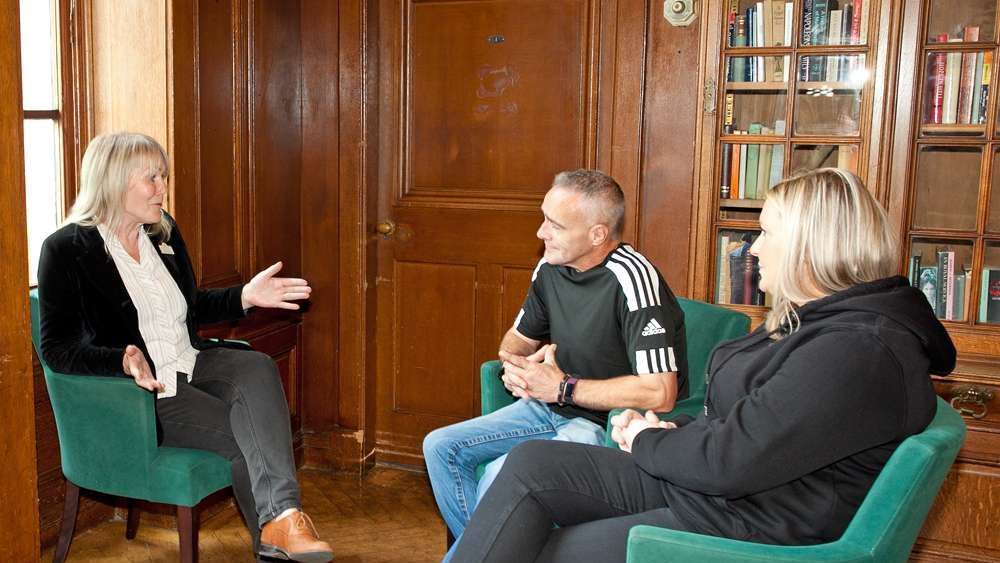Table of Contents
Deciding to quit alcohol is a courageous step towards a healthier and more fulfilling life. While the idea of immediate freedom from alcohol may seem appealing, it is essential to understand the potential dangers associated with this approach.
Is it Safe to Quit Alcohol Cold Turkey?
When undertaking the road toward sobriety, it is necessary to be aware that abrupt alcohol cessation can be devastating for anyone struggling with alcohol addiction.
Since alcohol is a drug, it can cause the same feelings of craving, ranging from simply unpleasant sensations to severe alcohol withdrawal symptoms, which can be life-threatening.
Dangerous Side Effects of Alcohol Withdrawal
According to research, even occasional alcohol consumption impacts the brain.
However, those who suffer from alcohol use disorder may experience a permanent effect. When the central nervous system becomes accustomed to high levels of alcohol, it causes a deficiency in cases of sudden abstinence.
Symptoms such as anxiety, nausea, vomiting, insomnia, heavy sweating, and hand tremors may appear as soon as six hours following the last drink.
Can You Die from Quitting Alcohol Cold Turkey?
Going cold turkey with alcohol can be deadly, especially if the person suffers from severe alcohol addiction and experiences serious withdrawal symptoms such as delirium tremens.
Delirium tremens is the most severe manifestation of alcohol withdrawal syndrome, as it brings convulsions and risky dehydration. As its name suggests, delirium tremens involves shaking, general confusion, and seizures, which can lead to fatal complications.
Alcohol has a similar effect on the brain as the neurotransmitter GABA.
GABA controls communication between neurons by inhibiting the effects of other stimulatory neurotransmitters such as noradrenaline, serotonin, or dopamine. Essentially, this means when someone is intoxicated, their brain reduces the production of GABA.
When someone abruptly quits alcohol, the production of GABA is insufficient to restrain the action of stimulating neurotransmitters. The brain becomes overstimulated and can no longer control bodily functions like blood pressure, heart rate, and body temperature. The patient may suffer hallucinations, high blood pressure, fever, and even death.
Anyone undergoing alcohol withdrawal should avoid abruptly quitting if they are heavily dependent on it and instead undergo a planned detox with medical supervision.

Download Our Brochure
Alcohol Withdrawal Symptoms
Quitting cold turkey or drastically reducing drinking can cause alcohol withdrawal syndrome (AWS), manifesting as a mild hangover or withdrawal delirium.
Untreated and unmonitored alcohol withdrawal syndrome can lead to severe symptoms that can cause a coma and even be fatal. Any withdrawing individual must receive proper medical attention and medications to ensure a safe withdrawal process.
Post-Acute Withdrawal Syndrome (PAWS)
In cases of extreme and chronic alcohol misuse, post-acute withdrawal syndrome (PAWS) can occur.
PAWS manifests as anxiety, panic attacks, a depressed state, cramps, pain, and burning sensations in the limbs. Medical intervention and monitoring are necessary for patients going through this intense post-acute withdrawal phase, as it can lead to serious medical complications.
Winning the battle against alcohol dependence is hard. It requires a lot of determination and courage from the individual. Fortunately, with proper alcohol addiction treatment, even a heavy drinker can begin the journey to recovery.
Common Alcohol Withdrawal Symptoms When Quitting Cold Turkey
When someone quits alcohol cold turkey, symptoms start showing up around 24 hours after they stop drinking. Common alcohol withdrawal symptoms include shaking, intense headache, fatigue, nausea, anxiety, irritability, depression, and confusion.
Withdrawal symptoms peak between a day and two days. After three days have passed, most patients usually feel much better.
How Long Do Alcohol Withdrawal Symptoms Last?
When someone quits drinking cold turkey, withdrawal symptoms may manifest as early as two hours after their last drink or up to eight hours later. On average, these symptoms persist for roughly one week until the individual fully recovers.
However, depending on the severity of the addiction and the individual’s physical health and mental condition, withdrawal can last longer than a week. Some patients may require several weeks of treatment before they get free from all the withdrawal symptoms.

Physical Symptoms of Alcohol Withdrawal
Alcohol withdrawal is an intense process that produces adverse effects in addicted patients.
The severity of the symptoms may vary from patient to patient or the method used to detox from alcohol. It can range from a simple hangover to a deadly delirium tremens. If you decide to quit alcohol cold turkey, you will experience physical symptoms. Among the most common:
- An overall feeling of weakness and exhaustion;
- Severe headaches;
- Dry mouth;
- Nausea;
- Light-headedness;
- Shaky hands and body;
- Dizziness;
- Arrhythmia;
- Fever.
Psychological Symptoms of Alcohol Withdrawal
It is not just the body but also the mind that feels the effects of alcohol withdrawal.
A person undergoing cold turkey alcohol withdrawal may experience psychological distress and a range of symptoms, such as:
- Anxiety;
- Depression;
- Feeling down;
- Confusion and disorientation;
- Panic attacks;
- Restlessness and irritability;
- Insomnia and frequent nightmares;
- Intense cravings.
Free Confidential Addiction Assessment
Taking the first step towards seeking help can be very difficult, our team is here to help you.
Symptoms of Acute Alcohol Withdrawal
- Alcohol shakes and tremors
Alcohol tremors are one of the most telling symptoms of sudden abstinence.
This physical withdrawal symptom can appear within the first 24 hours after you quit drinking cold turkey as a reaction to the sudden imbalance it causes within the body. Typically it is seen in the hands, which shake uncontrollably, making it difficult for a person to eat or write.
- Insomnia
Often people who stop drinking cold turkey deal with insomnia.
Numerous research studies have examined the relationship between biological rhythms and addiction. According to them, 90 percent of individuals dependent on alcohol suffer from sleep problems.
These issues can look different for each person, showing up as difficulty falling asleep, frequent night awakenings, waking earlier than usual, and poor sleep quality.
- Epileptic seizures
Epileptic seizures are due to abnormal and uncontrollable neuron activity.
Alcohol disrupts the body’s metabolic processes and increases the likelihood of epilepsy, whether someone only engages in binge drinking at parties or struggles with long-term alcohol misuse.
When going through alcohol withdrawal, epileptic seizures are rare, but they happen.
These seizures typically occur within the first 12 hours of abstinence, with the highest risk in those aged 15 to 30 and men more so than women.
Withdrawal seizures can lead to severe consequences if someone mixes alcohol and sedatives or has a history of epilepsy or head trauma.
Signs and Symptoms of Delirium Tremens
Delirium tremens (DTs) is a dangerous and potentially fatal neurological condition that can arise in individuals withdrawing from heavy alcohol misuse.
What Is Delirium Tremens, and How Does It Occur?
Delirium tremens is one of the most dangerous symptoms that can occur during withdrawal. It can last several days and sometimes has severe consequences for the patient. The person affected will experience altered consciousness, difficulty orienting themselves in time and space, and vivid hallucinations. The patient may also experience persistent body tremors accompanied by profuse sweating, anxiety without reason, insomnia, fever, heart palpitations, and severe dehydration. All these symptoms can vary in intensity from patient to patient, depending on various factors.
How Can I Differentiate Delirium Tremens Symptoms From Regular Alcohol Withdrawal?
Alcohol withdrawal is a natural reaction when someone stops consuming alcohol after drinking a lot for an extended period. Even casual drinkers can experience it in the form of hangovers. Delirium tremens is the most extreme and dangerous type of withdrawal and generally affects heavily addicted individuals who abruptly cease drinking without medical help.
To tell the difference, note the symptoms: DTs include intense hallucinations, severe malaise, and intense trembling. You will not see these symptoms in typical cases of alcohol withdrawal.
Recognising the Early Symptoms of Delirium Tremens
The first signs of alcohol withdrawal can appear shortly after a person suffering from alcohol use disorder has quit cold turkey. Common symptoms include irritability, sweating, and trembling hands and arms.
If the patient does not receive treatment promptly, the withdrawal syndrome may become more severe and cause agitation, confusion, delirium symptoms, and occasionally hallucinations. Therefore, worsening withdrawal symptoms and acute deterioration in the patient’s mental or physical state are often the initial warning signs of a potential DTs episode.
Medications and treatments used for managing delirium tremens – When should I seek medical attention for suspected DTs?
Alcohol withdrawal delirium is a medical emergency requiring immediate attention from medical professionals. First aid usually includes putting the patient in a quiet, calming environment with supervision, followed by rehydration either orally or through an IV, administering benzodiazepines the same way, and giving vitamin B1, which is essential for muscle and brain function but significantly deficient in alcoholics.
If you are attempting to quit alcohol without medical supervision, it is necessary to seek urgent medical attention if withdrawal symptoms become increasingly severe. If you have a history of heavy drinking or substance misuse, do not attempt to quit drinking cold turkey without professional help, as you are at higher risk of suffering from DTs.

Delirium Tremens vs. Alcohol Withdrawal – Understanding the Difference
Role of Alcohol Misuse in Triggering Delirium Tremens – How Does Alcohol Misuse Contribute to Delirium Tremens?
Delirium tremens is a severe form of alcohol withdrawal.
If someone has been drinking a lot and then stops without transitioning slowly, their nervous system goes into overdrive which causes shakes, spasms, and vivid hallucinations.
The risk of developing DTs during withdrawal depends on how much the patient drinks before starting the detox, their physical and mental health, and their history of drug misuse.
How Do Delirium Tremens Differ From Typical Alcohol Withdrawal Symptoms?
Delirium tremens is the most extreme and possibly life-threatening manifestation of withdrawal syndrome, occurring in chronic drinkers.
DTs are, in fact, the apparition of severe withdrawal symptoms.
What Are the Typical Behavioural Changes During Delirium Tremens?
People enduring an episode of DTs exhibit multiple changes in behaviour. These include confusion, disorientation, difficulty staying still, irritability, and hallucinations.
The Importance of Medically Managed Alcohol Detox – The First Step of Alcohol Addiction Treatment
How Long to Detox From Alcohol?
Most detox treatments last from one to two weeks, though this can be extended depending on the situation, and symptoms may linger.
Once the process of withdrawing from alcohol is complete, patients must continue to receive support and care through individual sessions and support groups like alcoholics anonymous.
Can You Safely Detox From Alcohol at Home?
Home detox may not be advisable or feasible depending on how much alcohol you consume regularly.
If you have a history of heavy drinking, you should never quit cold turkey without medical supervision, as it could put your life at risk.
The only way to achieve sobriety safely is to opt for an inpatient detox program in a detox centre that will provide the support and resources to help you get better quickly.
Safe, Effective Alcohol Detox & Addiction Treatment at Castle Craig
Castle Craig’s detox unit stands out among other treatment centres.
When patients reach out for help and arrive at Castle Craig, they meet a team of trained doctors and nurses who assess their health and develop an individualised treatment plan addressing their specific symptoms of alcohol addiction.
With 24/7 supervision and medical help, patients go through the first stage of recovery safely.
When the body is clean from alcohol, they can go on with intensive individual counselling, group therapy, and family therapy.
There are also leisure activities like music therapy and art therapy which have proven effective in helping them find themselves again and learn how to appreciate life.
After leaving Castle Craig, ongoing support and guidance will help the patient maintain a healthy lifestyle and avoid relapse.
Frequently Asked Questions
Can I Quit Alcohol Cold Turkey Without Medical Assistance?
Quitting cold turkey means stopping drinking alcohol abruptly without medical assistance, which can be dangerous for heavy drinkers, leading to dangerous withdrawal symptoms and even death.
Can You Die if You Quit Drinking Alcohol Cold Turkey?
You can die from quitting alcohol cold turkey, as it can lead to delirium tremens, a life-threatening condition.
Is It Better to Quit Alcohol Cold-Turkey or Slowly?
Quitting cold turkey without medical help can be effective for moderate drinkers but life-threatening for those with a history of heavy alcohol misuse.
What to Expect When Quitting Alcohol Cold Turkey?
If you have a history of heavy drinking, you might expect mild to severe withdrawal symptoms requiring medical assistance.
What Are the Risks of Quitting Alcohol Abruptly?
Severe alcohol withdrawal symptoms and DTs are two major risks of quitting alcohol abruptly.

